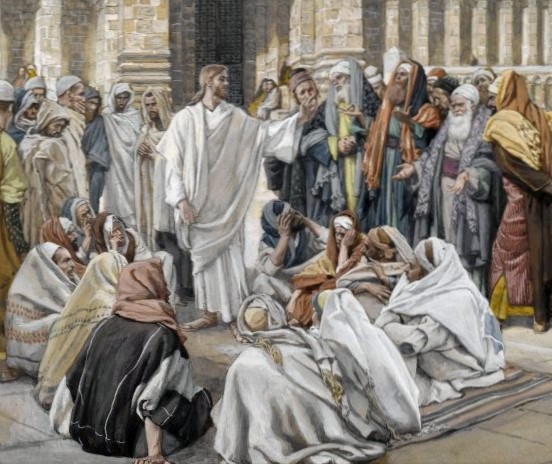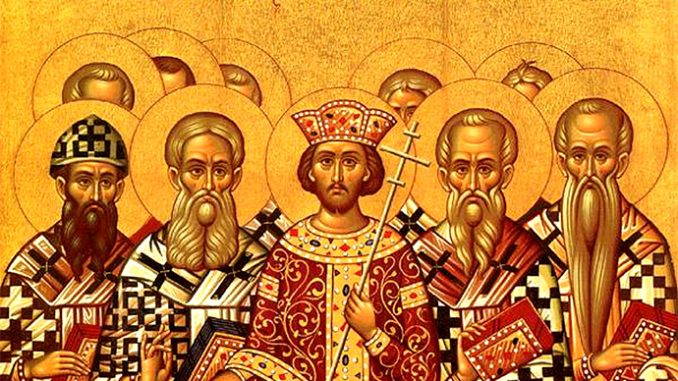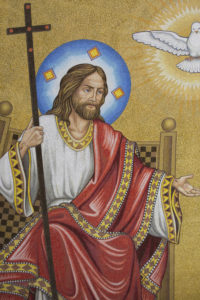GOSPEL READING: Luke 19:45-48
45 And he entered the temple and began to drive out those who sold, 46 saying to them, “It is written, `My house shall be a house of prayer’; but you have made it a den of robbers.” 47 And he was teaching daily in the temple. The chief priests and the scribes and the principal men of the people sought to destroy him; 48 but they did not find anything they could do, for all the people hung upon his words.
Meditation: Why did Jesus drive out the money changers in the temple at Jerusalem? Was he upset with their greediness? This is the only incident in the Gospels where we see Jesus using physical force. Jesus went to Jerusalem, knowing he would meet certain death on the cross, but victory as well for our sake. His act of judgment in the temple is meant to be a prophetic sign and warning to the people that God takes our worship very seriously.
Jesus honors the Father’s house of prayer by cleansing it of unholy practices
In this incident we see Jesus’ startling and swift action in cleansing the temple of those who were using it to exploit the worshipers of God. The money changers took advantage of the poor and forced them to pay many times more than was right – in the house of God no less! Their robbery of the poor was not only dishonoring to God but unjust toward their neighbor.
The people were hungry for the word of God
In justification for his audacious action Jesus quotes from the prophets Isaiah (Isaiah 56:7) and Jeremiah (Jeremiah 7:11). His act of judgment aims to purify the worship of God’s people and to discipline their erring ways. Despite the objections of the religious leaders, no doubt because Jesus was usurping their authority in the house of God, the people who listened to Jesus teaching daily in the temple regarded him with great awe and respect. Luke tells us that “they hung upon Jesus’ words”(Luke 19:48). How hungry are you for God’s word?
The Lord wants to share his holiness with us
If we approach God’s word with a humble attentive heart and with a willingness to be taught by the Lord, then we are in a good place to allow God’s word to change and transform us in the likeness of Christ. The Lord wants to teach us his ways so that we may grow in holiness. The Lord both instructs and disciplines us in love to lead us from the error of our sinful ways to his truth and justice. “God disciplines us for our good, that we may share in his holiness” (Hebrews 12:10). The Lord calls us to be a holy people who worship him with reverence and gratitude for his great mercy and kindness towards us. Do you allow God’s word to transform you in his way of love and holiness?
Lord Jesus, you open wide the door of your house and you bid us to enter confidently that we may worship you in spirit and truth. Help me to draw near to you with gratitude and joy for your great mercy. May I always revere your word and give you acceptable praise and worship.
Psalm 119:14,24,72,103,111,131
14 In the way of your testimonies I delight as much as in all riches.
24 Your testimonies are my delight, they are my counselors.
72 The law of your mouth is better to me than thousands of gold and silver pieces.
103 How sweet are your words to my taste, sweeter than honey to my mouth!
111 Your testimonies are my heritage for ever; yes, they are the joy of my heart.
131 With open mouth I pant, because I long for your commandments.
Daily Quote from the Early Church Fathers: The home of sanctity, by Augustine of Hippo, 354-430 A.D.
“God does not want his temple to be a trader’s lodge but the home of sanctity. He does not preserve the practice of the priestly ministry by the dishonest duty of religion but by voluntary obedience. Consider what the Lord’s actions impose on you as an example of living… He taught in general that worldly transactions must be absent from the temple, but he drove out the money changers in particular. Who are the money changers, if not those who seek profit from the Lord’s money and cannot distinguish between good and evil? Holy Scripture is the Lord’s money.” (excerpt from EXPOSITION OF THE GOSPEL OF LUKE 9.17-18)






